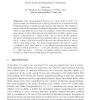Free Online Productivity Tools
i2Speak
i2Symbol
i2OCR
iTex2Img
iWeb2Print
iWeb2Shot
i2Type
iPdf2Split
iPdf2Merge
i2Bopomofo
i2Arabic
i2Style
i2Image
i2PDF
iLatex2Rtf
Sci2ools
113
click to vote
CRYPTO
1998
Springer
1998
Springer
An Efficient Discrete Log Pseudo Random Generator
The exponentiation function in a finite field of order p (a prime number) is believed to be a one-way function. It is well known that O(log log p) bits are simultaneously hard for this function. We consider a special case of this problem, the discrete logarithm with short exponents, which is also believed to be hard to compute. Under this intractibility assumption we show that discrete exponentiation modulo a prime p can hide n-(log n) bits (n = log p and p = 2q+1, where q is also a prime). We prove simultaneous security by showing that any information about the n - (log n) bits can be used to discover the discrete log of gs mod p where s has (log n) bits. For all practical purposes, the size of s can be a constant c bits. This leads to a very efficient pseudo-random number generator which produces n - c bits per iteration. For example, when n = 1024 bits and c = 128 bits our pseudo-random number generator produces a little less than 900 bits per exponentiation.
CRYPTO 1998 | Cryptology | Discrete Exponentiation Modulo | Exponentiation Function | Pseudo-random Number Generator |
Related Content
| Added | 05 Aug 2010 |
| Updated | 05 Aug 2010 |
| Type | Conference |
| Year | 1998 |
| Where | CRYPTO |
| Authors | Sarvar Patel, Ganapathy S. Sundaram |
Comments (0)

